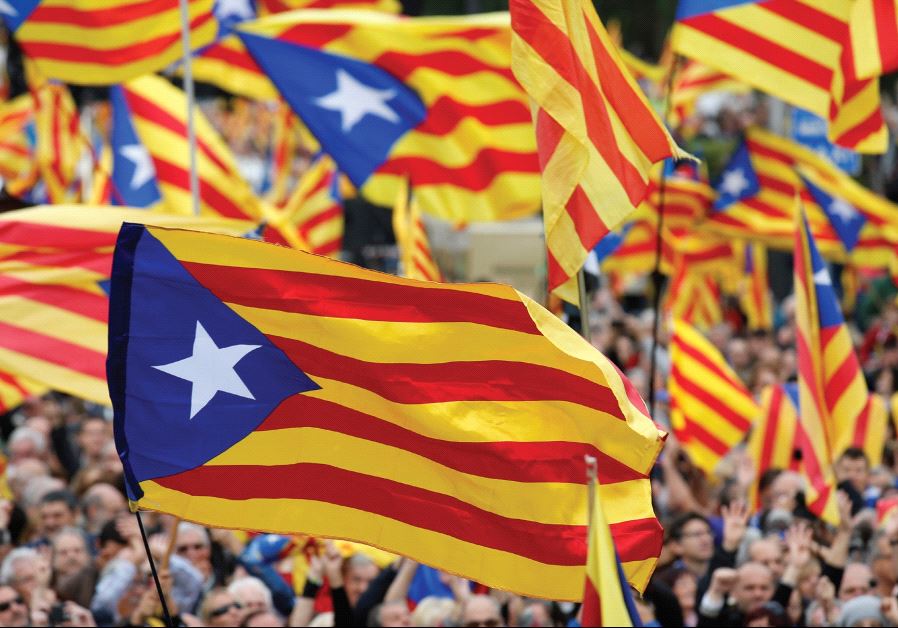
IBERIAN BREAKUP?
Catalonia formalises plans for independence referendum

Today the regional Government of Catalonia is set to pass legislation that would formalise a referendum on Catalonian independence from Spain scheduled for October 1.
Although the quasi-autonomous province already has an independent parliament and police force, separatist movements have been gaining steam for a decade, culminating in the success of a left-wing pro-independence coalition in the 2015 regional elections. While a non-binding low-turnout referendum in 2014 endorsed independence with 80% of the vote, polling consistently shows unionists have a slight edge over separatists.
Even if public support for Catalonian independence were stronger, gaining it by holding a referendum is proving difficult as both the United Nations and the Spanish government oppose a vote and the country’s Constitutional Court has deemed the upcoming referendum unconstitutional.
Madrid is further threatening legal action against Catalonian regional leaders, as well as companies or civil servants that assist in organising the referendum. The government is also considering invoking Article 155 of the constitution, which would allow them to nationalise the Catalonian police or shut down schools and other potential polling places.
Although Catalonian leaders remain defiant, sturdy opposition from the government and division within the Catalonian population makes secession unlikely.
HOLY INFLUENCE
Holy Father arrives in Colombia after helping secure peace

Pope Francis will touch down in Bogota today—the first papal visit to Colombia in 31 years.
Today’s visit fulfils a pledge Francis made in February 2016, when he was asked whether he planned on visiting Colombia. The pope responded he would if peace talks with FARC rebels advanced. Almost 18 months later, the leftist rebel group has completely demobilised and now sits in Colombia’s parliament.
Pope Francis also arrives 48 hours after Colombia’s remaining Marxist rebel group—the ELN—signed a four-month ceasefire with the government.
The Holy See’s role in mediating protracted conflicts across the Roman Catholic world cannot be understated; the ELN has called Pope Francis’ visit “an extra motivator”.
Catholic officials have also used their outsized influence to push for political solutions to the Venezuela crisis—sponsoring talks between socialist President Nicolas Maduro and the opposition—and the DR Congo, where the Church brokered a deal for a political transition. There, Pope Francis has much work to do. But in Colombia, he’ll use a public address to hundreds of thousands of the country’s 34 million Catholics to pray that peace holds.
THRONGING TO THE EAST
Russian and South Korean presidents to meet at economic forum

The third annual Eastern Economic Forum, which advertises investment opportunities in the Russian Far East to foreign businesses and governments, will be held today and tomorrow in Vladivostok.
At last year’s conference, over 200 business agreements—totalling over $26 billion—were signed. This year, expectations have dampened—investment projections are hovering around the $20 billion mark—due to investor uncertainty in sectors hit by new US sanctions this August.
Investment aside, President Putin will meet South Korean President Moon Jae-in, to discuss North Korea. Russia has become more involved in the dispute recently and has clashed with Seoul on possible solutions, particularly over Putin’s support for peace talks without preconditions rather than sanctions.
Compared to the US and China, Moscow is a side player on the North Korean issue. But, Russia’s intrusions into the situation serve to bolster its image, both domestically and internationally, as a global power and a potentially more effective peace-broker than Washington.
It is unlikely that the presidents will reconcile their differences on the issue as a result of this meeting; expect discussions regarding Pyongyang to be rather superficial.

